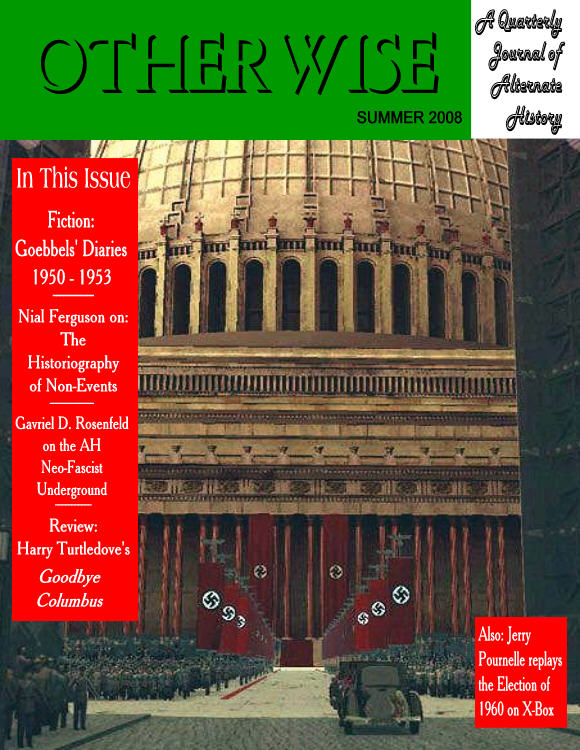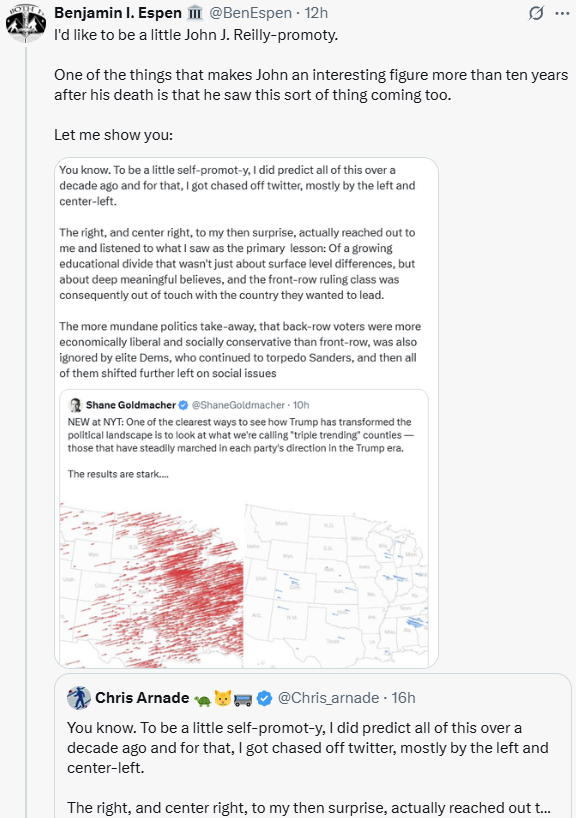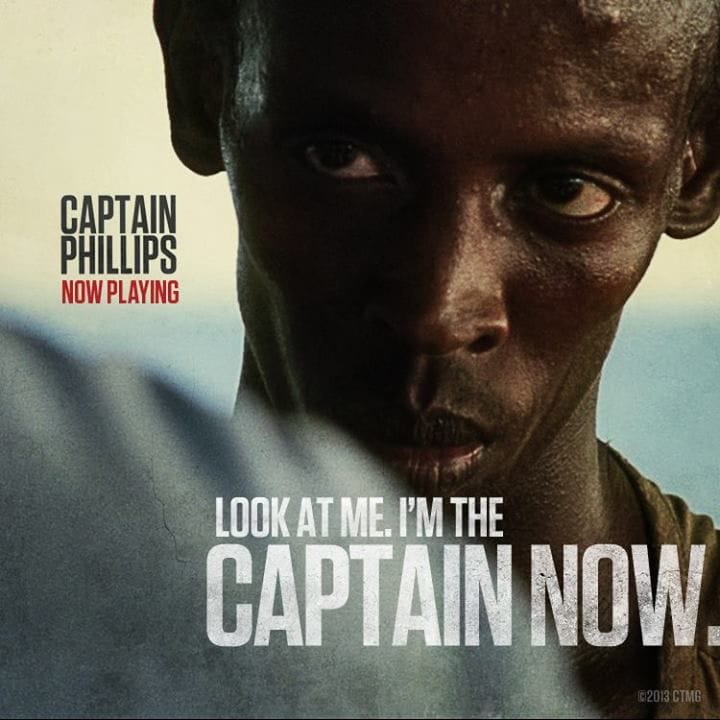The Long View 2007-02-14: Happy Non-Existence; Who Lost Britain; AH Mag; The Longer Boom; Carl Sagan; God & Logos

I would have definitely read this magazine.
Happy Non-Existence; Who Lost Britain; AH Mag; The Longer Boom; Carl Sagan; God & Logos
This study may have implications as unnerving as a trapdoor, if you think about it:
LONDON (Reuters) - Britain is the worst country in the industrialized world in which to be a child, the United Nations Children's Fund ( UNICEF) said on Wednesday...Britain lagged behind on key measures of poverty and deprivation, happiness, relationships, and risky or bad behavior, the study showed.
It scored a little better for education but languished in the bottom third for all other measures, giving it the lowest overall placing, along with the United States.
Children's happiness was rated highest in northern Europe, with the Netherlands, Sweden and Denmark leading the list. ...The study found there was no consistent relationship between a country's wealth, as measured in gross domestic product per capita, and a child's quality of life.
The Czech Republic, for example, achieved a higher overall ranking than economically wealthier France....
Colette Marshall, UK director of charity Save the Children...said "drastic action," including an injection of 4.5 billion pounds, was needed to meet a government target of halving the number of children in poverty by 2010.
I am as opposed to neglecting children as the next guy is, but may I point out that this ranking of child welfare correlates inversely with fertility rates? It does not do so perfectly: France has a somewhat higher fertility rate than Britain does, for instance. Nonetheless, the countries singled out for the best treatment of children all seem to be on a glide-path to extinction. Could it be that one effect of "halving the number of children in poverty" would be halving the number of children?
* * *
Meanwhile, Mark Steyn has broadened his area of concern to include the zombie menace. "Who lost Britain?" Indeed.
* * *
Is the United States no longer a status quo power? That is one way to read this assessment from Spengler at Asia Times:
Some years ago I suggested that option theory offered insights into geopolitics. During the Cold War, the Soviet Union was the spoiler, seeking advantage from instability, while the United States sought to maintain stability. In financial parlance, the Russians were long volatility; they stood to exercise their political options opportunistically, and the more chaotic and uncertain the state of the world, the better for Moscow. For the past 20 years, though, it is Washington that is long volatility; in the absence of a contending superpower, instability frightens all contending parties into seeking help from Washington. The more unstable and uncertain the world, the stronger the position of the United States. Whether or not the US recognizes this is beside the point; the fact that President George W Bush has made a dog's breakfast of Iraq makes America's world position stronger.
If so, then what are we to make of these further observations?
A friend in financial markets observes that the world appears to be safer than at any time on record, judging by the cost of insurance against economic disaster...
Professor Niall Ferguson of Harvard observes that world markets anticipated the outbreak of neither World War I nor II.
This is just another example of the return of the Long Boom mentality. Regarding the most recent Davos meeting, for instance, Richard Landes quotes a report on the many meetings about climate change, but notes this:
And apparently, no one mentioned global Jihad, which puts “real war” in the shade for its wide range of fronts and tactics.
The Eloi never know what the Morlochs are up to, until dinner time.
* * *
Sometimes I think it would be more fun to publish a little magazine than to write articles for one, but look at the kind of ideas I come up with. [see the post header for JJR’s magazine cover -BE]
* * *
I was always a great fan of Carl Sagan. I was never put of by his occasional effusions of agnosticism. Like many agnostics of high general intelligence, he did not realize that he did not know enough theology to make a serious critique of it. Unfortunately, his widow has seen fit to publish a compendium of this weakest aspect of his legacy:
“The Varieties of Scientific Experience: A Personal View of the Search for God” (Penguin). The book is based on a series of lectures exploring the boundary between science and religion that Dr. Sagan gave in Glasgow in 1985, and it was edited by Ann Druyan, his widow and collaborator....
It was Ms. Druyan’s impatience with religious fundamentalism that led her to resurrect Dr. Sagan’s lectures, which were part of the Gifford Lectures, a prestigious series about natural theology that has been going on since the 19th century.....
Ever the questioner, Dr. Sagan asks at one point in his lectures why the God of the Scriptures seems to betray no apparent knowledge of the wider universe that “He or She or It or whatever the appropriate pronoun is” allegedly created. Why not a commandment, for instance, that thou shalt not exceed the speed of light? Or why not engrave the Ten Commandments on the Moon in such a way that they would not be discovered until now, à la the slab in “2001: A Space Odyssey”?
There are many reasons why religious people in recent decades have tried to edit the physical science taught in the schools, but one of the chief reasons was the efforts of popular-science writers to present their own metaphysical views as the results of modern science. Creationism is nonsense, but no greater nonsense than Stephen Jay Gould's postmodern biology.
The late Cold War did not always see Sagan at his best. His Nuclear Winter hypothesis has not held up very well, either.
* * *
Vox Day does know enough theology to rise to the level of refutable error, or so I would characterize this exercise in walking the plank:
If I am correct that my God is the Creator God, that we are all his creations, then killing every child under two on the planet is no more inherently significant than a programmer unilaterally wiping out his AI-bots in a game universe. He alone has the right to define right and wrong, and as the Biblical example of King Saul and the Amalekites demonstrates, He has occasionally deemed it a moral duty to wipe out a people.
The argument about whether God is arbitrary is not new, but it is currently topical. Benedict XVI took the other side of the question in the Regensburg Address:
Is the conviction that acting unreasonably contradicts God's nature merely a Greek idea, or is it always and intrinsically true? I believe that here we can see the profound harmony between what is Greek in the best sense of the word and the biblical understanding of faith in God. Modifying the first verse of the Book of Genesis, the first verse of the whole Bible, John began the prologue of his Gospel with the words: "In the beginning was the [logos]". This is the very word used by the [Byzantine] emperor [Manuel II]: God acts, [su 'n logos], with logos. Logos means both reason and word - a reason which is creative and capable of self-communication, precisely as reason. John thus spoke the final word on the biblical concept of God, and in this word all the often toilsome and tortuous threads of biblical faith find their culmination and synthesis. In the beginning was the logos, and the logos is God, says the Evangelist.
Actually, I am inclined to think that Benedict is wrong when he says that the rationality of the logos is incompatible with violence under any circumstances. (And yes, anyone can disagree with the address, since Benedict was speaking as a speculative theologian, not ex cathedra.) However, the point is that reason belongs to the divine substance; it is not a mere creation of the divine.
Copyright © 2007 by John J. Reilly
Support the Long View re-posting project by downloading Brave browser. With Both Hands is a verified Brave publisher, you can leave me a tip too!



Comments ()